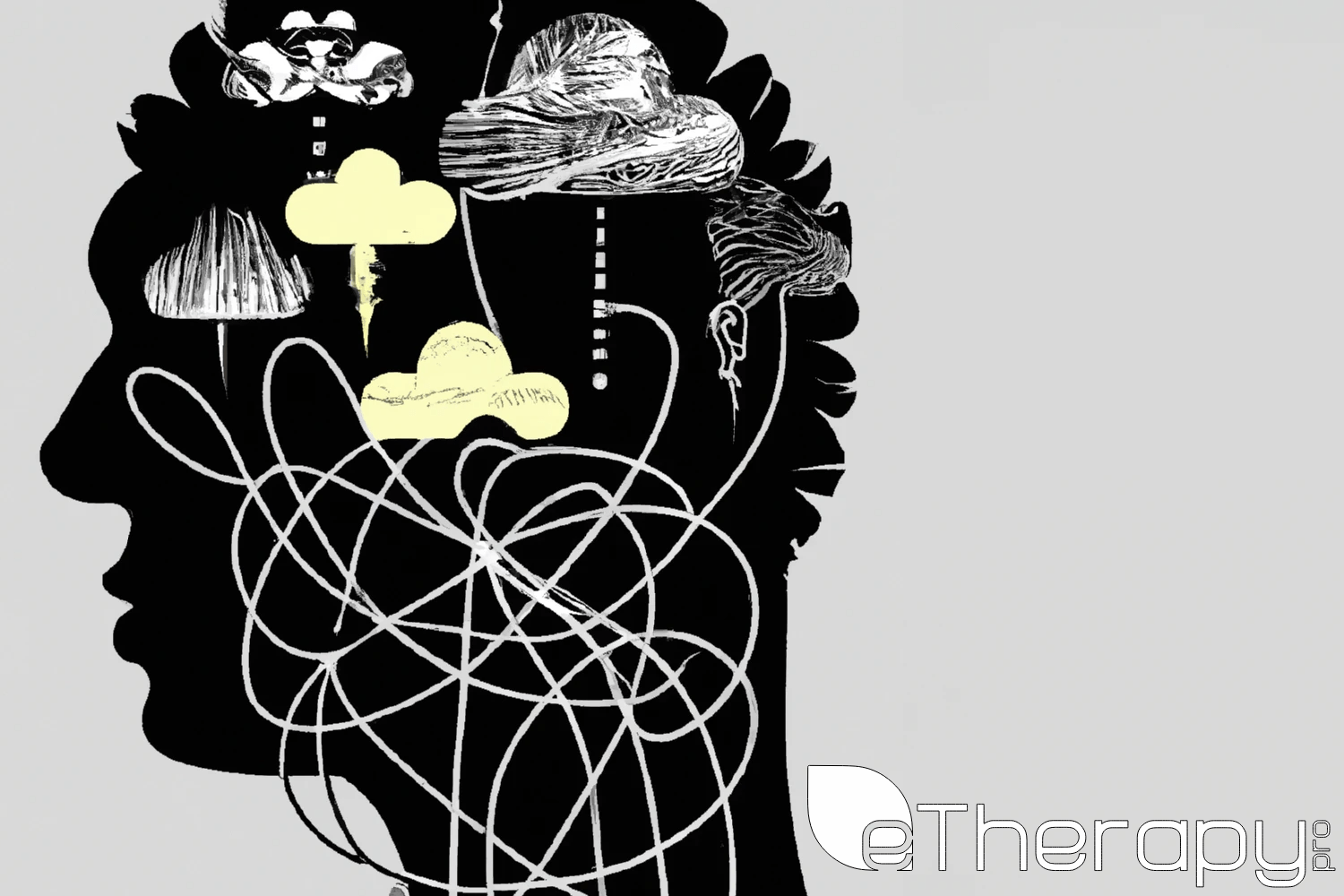 The silence of the night contrasts sharply with the cacophony inside your mind. You’re lying in bed, eyes darting behind closed lids, as thoughts cascade relentlessly — replaying conversations, imagining the “what ifs,” and fabricating scenarios that may never come to pass. This is overthinking in its most palpable form, a nightly ritual for countless individuals worldwide. The feeling is as overwhelming as it is familiar.
The silence of the night contrasts sharply with the cacophony inside your mind. You’re lying in bed, eyes darting behind closed lids, as thoughts cascade relentlessly — replaying conversations, imagining the “what ifs,” and fabricating scenarios that may never come to pass. This is overthinking in its most palpable form, a nightly ritual for countless individuals worldwide. The feeling is as overwhelming as it is familiar.
Clinically speaking, overthinking or rumination isn’t just a buzzword for the introspective. It’s a cognitive activity that involves excessively thinking about the same thoughts, scenarios, or events. These recurrent thoughts are not just trivial; they are laden with anxiety, constantly dissecting past actions or anticipating future challenges. It’s a behavioral pattern that, left unchecked, can swiftly morph into anxiety disorders, signaling that the effects of overthinking are far-reaching. Managing to overthink, while challenging, becomes imperative for mental wellness.
The happiness of your life depends upon the quality of your thoughts. – Marcus Aurelius
But what if, in this relentless introspection, there lies an opportunity? An opportunity to truly understand oneself, to demarcate one’s comfort zone, and to uncover avenues for growth? Discomfort, as you’ll discover, isn’t your adversary. It’s an integral facet of life, as inescapable as it is invaluable. Instead of waging a tireless war against it or the overthinking it often catalyzes, what if we learned to lean into it, finding liberation and growth amidst the unease? The journey may seem daunting, but rest assured: the rewards of understanding and embracing discomfort are profound.
The Mechanics of the Overthinking Mind
We’ve all been there – caught in the web of our thoughts, each one looping over the last, leaving us trapped in an endless cycle of contemplation. But why does our mind do this? Let’s pull back the curtain on this enigmatic process.
Negative Thoughts and the Elusive Floating Fear
Our minds are adept at constructing and revisiting scenarios that might seem endlessly perplexing. These come in the form of negative thought loops or an undefined, lingering anxiety.
Negative Thoughts as Unfinished Loops
Think of negative thoughts as incomplete loops. Each thought triggers a spiral of interconnected sentiments, memories, and anxieties. Like a song on repeat, our brain revisits them, searching for a resolution or closure that’s often elusive. These loops, while natural, can become tiring and consume valuable mental energy if they remain open for extended periods.
The Elusive “Floating Fear”
Beyond specific worries, there’s an ambiguous sensation many of us grapple with – a kind of “floating fear.” It’s not tied to any particular event, person, or outcome. Instead, it’s a general unease, a sense that something isn’t quite right, even if we can’t pinpoint what. This form of anxiety is intangible, making it harder to address, but it’s a common companion to overthinking.
Overthinking: The Journey to Self-awareness
In the labyrinth of our thoughts, the beacon of self-awareness guides us. Identifying the triggers and roots of overthinking can be our greatest asset.
The Power of Self-Awareness and Recognizing Triggers
While understanding the nature of overthinking is crucial, the real power lies in self-awareness. Recognizing our triggers is the first step in managing overthinking. Whether it’s a comment from a colleague, an impending decision, or the weight of an unresolved issue, identifying what kickstarts our overthinking patterns allows us to preemptively address them. By understanding our mental triggers, we can start to control our reactions, pivoting from passive rumination to active problem-solving.
Emotions, Archetypes, and the Depth of Overthinking
To understand oneself is the beginning of wisdom, – Jiddu Krishnamurti.
Beyond the surface of recurrent thoughts lies a complex web of emotions, past experiences, and deep-seated beliefs that inform our reactions to daily situations. Understanding the roots of our overthinking—the real “on buttons”—can be a transformative step towards self-awareness and eventual growth.
Beyond the Surface: The Emotional Roots of Overthinking
When overthinking takes the form of negative thoughts, it’s often a manifestation of underlying discomfort. This discomfort stems from ingrained beliefs and past experiences that have shaped our emotional responses. It’s not just about what sets off the overthinking, but why it does.
For example:
The Argument: Replaying an argument in our minds might be triggered by a feeling of embarrassment or ineptitude. But deep down, the real discomfort arises from an ingrained belief that we’re not good enough or that we constantly need to prove ourselves.
Worrying About Our Children: While on the surface, this seems like a product of love and care, the deep-rooted fear comes from a place of mistrust in the world. This mistrust might originate from past traumas or experiences that have conditioned us to anticipate the worst.
Real self-awareness arises when we can pinpoint these deeper, foundational reasons behind our overthinking. It’s a journey of introspection, of confronting discomfort, and most importantly, of understanding and accepting oneself.
The Overthinking Archetypes and Their Deep-Seated Beliefs
While each overthinker is unique, many fit into distinct categories. These categories aren’t just labels but can help us trace back to core beliefs or past experiences that fuel our overthinking.
The Worrier: At the core of their constant anticipation of negative outcomes is a belief that they’re not prepared or resilient enough to handle life’s challenges.
The Planner: Their need for meticulousness is rooted in a fear of unpredictability, perhaps stemming from a past where they felt out of control or caught off-guard.
The Ruminator: Their fixation on the past indicates a deep-seated belief that they’ve made irreversible mistakes or that they’re bound to repeat them.
The Self-Critic: Their internal harshness often stems from a place of not feeling worthy or from past experiences where they felt undervalued.
Tackling overthinking requires us to not just identify but also to understand. By tracing our triggers back to their emotional roots, we gain a deeper awareness of ourselves. And it’s this awareness that lights the path forward, guiding us toward understanding, acceptance, and growth.

The Tug-of-War: Control vs. Acceptance
The constant dance of overthinking often reveals an internal tension: our yearning for a predictable, controllable environment versus the inescapable uncertainties of life. This tussle emerges from our deep-seated need for control against the backdrop of life’s inherent unpredictability.
The Subtle Yearning for Control
Pause and ponder for a moment.
If you had absolute certainty that your child would come home safely every night, wouldn’t that ease a significant portion of your anxiety?
Imagine walking into a room, confident in the knowledge that those who value you would approach while others would simply drift away. Would that not strengthen your self-assurance?
Consider the peace of knowing, without a shred of doubt, that all your tasks would be completed timely, either because of assistance or changing timelines.
These hypotheticals underscore our innate craving for certainty and predictability. Recognizing this as a form of control over outcomes is a pivotal step in our mental wellness journey.
Embracing the Inevitable: Uncertainty
The unpredictability of weather, ever-changing human emotions, unforeseen circumstances – so much lies beyond our sphere of control. Continuously chasing an unachievable level of predictability exhausts our mental reserves, amplifying our need for control and thereby increasing overthinking.
On the flip side, acceptance can act as a tranquil balm. Realizing that there will always be elements outside our grasp and learning to find peace with this fact can markedly reduce the mental churn of overthinking. Remember, acceptance isn’t about resignation; it’s about discerning our limits, letting go of control, and welcoming life’s ebb and flow.
The words of the Serenity Prayer resonate deeply here:
“God grant me the serenity to accept the things I cannot change, courage to change the things I can, and wisdom to know the difference.”
By acknowledging our limits and harnessing the wisdom to differentiate between what’s within our control and what isn’t, we open ourselves to a deeper understanding and eventual peace.
Immediate Coping Mechanisms: Shields in the Storm
Amidst the torrents of overthinking and the relentless waves of discomfort, we all yearn for an anchor, a shield that safeguards our sanity. While understanding and acceptance are long-term solutions, there are immediate coping strategies that can offer respite in times of distress. These tools, though temporary, provide a foundation upon which we can build more sustainable mental habits.
Grounding Techniques for the Here and Now
Inhale… Exhale… Breathing might sound trivial, but in the eye of the mental storm, it can be a powerful grounding force.
The 5-4-3-2-1 Method
A sensory-based strategy, this method involves:
- Recognizing 5 things you can see.
- Identifying 4 things you can touch.
- Noting 3 things you can hear.
- Pinpointing 2 things you can smell.
- Savoring 1 thing you can taste.
This practice shifts your focus from spiraling thoughts to the present moment, offering a mental reset.
Redirecting Mental Energy
Sometimes, the best way to counter overthinking is to redirect that energy elsewhere.
Mindful Activities
Engaging in activities that require our full attention – be it coloring, knitting, or even puzzle-solving, can offer an escape, providing our mind with a different channel of expression.
Express, Don’t Suppress
Writing down our thoughts, talking to someone, or even expressing through art can alleviate the pressure. Platforms like eTherapyPro provide a safe space for such expression, offering guidance and support when the storm feels overwhelming.
Embracing Acceptance
It’s crucial to observe a common theme among these strategies: none of them advise you to deny or chase away negative thoughts. They emphasize acceptance and present awareness. It’s not about whispering false assurances like “it won’t happen.” Instead, it’s about grounding oneself in the moment, accepting thoughts as they come, and choosing not to be swept away by them. Facing our thoughts, instead of fleeing from them, can be our most potent defense.
Such mechanisms don’t promise the elimination of discomfort or overthinking. But they do ensure a buffer, a momentary pause that can make all the difference.

Reimagining Control: Letting Go to Let Grow
In our previous discussion on immediate coping mechanisms, we delved deep into short-term strategies to handle anxiety and overthinking. These shields in the storm provide immediate relief. However, as we pivot towards a long-term perspective, it’s crucial to believe that chronic anxiety and overthinking aren’t life sentences. With dedication and the right approach, these challenges can transform into catalysts for personal growth. In this section, we explore transformative strategies aimed at a more profound, lasting change.
Embracing Discomfort: The Power of Acceptance
What you resist, persists. – Carl Jung
This profound quote from the renowned psychologist Carl Jung illuminates a fundamental truth: resisting discomfort only amplifies it. Growth and transformation are birthed from accepting and facing discomfort. The very core of overthinking often stems from an attempt to mentally control and predict every nuance of our lives. By acknowledging the roots of our anxieties, we pave the way toward addressing them.
Face the Root Emotions
Our past experiences play a significant role in shaping who we are. A journey dotted with highs and lows has made us into the unique individuals we stand as today. If ever you find a moment where you’re displeased with who you’ve become, it’s vital to remember that it might not be about changing who you are, but how you perceive yourself.
Consider this: If anxiety was your friend and it could talk, it might say, “Hey, every time you think about the future, you seem scared. Why?” Or, “I’ve noticed you often fear people’s judgments. What’s that about?”
When confronted with such questions, diving deeper into understanding them can often be therapeutic. For example:
“I’m scared about the future because I’m afraid of failing in my career.” To which you could further explore: What does “failure” mean to you? Is it about not advancing or not being recognized? Is it about getting fired? Remember, everyone has their own definition of success and failure. Maybe it’s time to redefine yours. And even in the direst circumstances, if you were to face professional setbacks, would it mean the end of your world? Would the people who love you think any less of you? Or would you simply find a new path, perhaps one better suited for you? A career is just one facet of life; happiness can be found in many avenues.
“I fear judgment because I was often criticized growing up.” It’s important to recognize that the criticisms of the past don’t define your worth in the present. Question if you’re holding onto outdated beliefs about yourself. Remember, as an adult, you have the agency to decide whose opinions matter and whose don’t. The criticisms you faced in your formative years were just opinions, not facts about your character. With time, understanding, and maybe even professional guidance, such wounds can heal.
Engage with these internal dialogues, not as a critic, but as a caring friend. Your anxiety, in its unique way, is trying to communicate. Understand that your anxiety, instead of being a menace, is a messenger of areas in your life that might need more self-love and respect. It’s like shining a light into a dark room; once illuminated, the unknown becomes known, and the fear often dissipates.
By understanding and communicating with these root emotions, you are not only acknowledging them but also transforming anxiety from an intimidating opponent into a guiding ally.
The Joy of Letting Go
Life isn’t about having a tight grip on everything but understanding that some things are beyond our control. It’s about how we respond to life’s unpredictable nature. It’s not about controlling the wind, but adjusting the sails.
Stepping into Vulnerability
Have you ever taken a leap of faith? Stepped outside your comfort zone? Remember the butterflies you felt when you confessed your feelings to someone for the first time? The vulnerability in that moment was palpable. But what about the reward? The sheer exhilaration of taking that chance!
Life’s most profound moments often come when we’re most vulnerable. When we take risks, when we dare to step outside of our comfort zones, we not only discover more about the world around us but also about ourselves. It’s not about making safe choices; it’s about making brave ones. So, challenge yourself. Embrace the unknown, and relish in the growth that follows.
Grounding Ourselves in the Present
The present moment, while fleeting, holds immense power. When we’re constantly dwelling on the past or fretting about the future, we miss out on the joys of now. Taking a deep breath, feeling the ground beneath our feet, and truly immersing ourselves in the present can be incredibly liberating. It’s a reminder that we are alive, we are here, and each moment is a gift waiting to be unwrapped.
Growth in Discomfort
To truly grow, one must move beyond the familiar and embrace the uncomfortable. Just as we discussed the power of accepting discomfort in the previous section, it’s equally essential to understand how discomfort catalyzes growth. This is especially true when it comes to dealing with negative thoughts and anxiety.
Negative thoughts, often borne out of fear, past experiences, or external pressures, are a form of mental discomfort. They aren’t necessarily the absolute truth about us or our potential, but rather reflections of our deepest insecurities and worries. These thoughts can be whispering murmurs or deafening screams, but regardless of their volume, they hold power only when we grant it to them.
When we encounter these thoughts, the immediate reaction might be to deflect, ignore, or drown them out. Yet, this is where the heart of the growth process starts. To move forward, we need to do three key things:
See Them: It starts with self-awareness. Before we can address anything, we need to be conscious of its existence. When negative thoughts arise, rather than shoving them aside, we should pause and acknowledge them.
Recognize Their Origin: Every thought has a root. Sometimes, it’s a past experience, a comment from someone, or an inherent fear. Recognizing the origin doesn’t mean justifying the thought, but understanding where it’s coming from can help in addressing it.
Talk to Them: This might sound odd, but conversing with our negative thoughts can be a transformative experience. Ask, “Why are you here? What are you trying to tell me?” It’s not about getting an answer, but more about understanding the emotion and fear behind the thought. Often, these thoughts are just signals that there’s something we need to address or confront.
However, recognizing and understanding is just half the battle. To truly grow in discomfort, we have to take the next step and act. Action could mean various things: challenging these negative beliefs by taking on tasks we thought we couldn’t, seeking professional help, or even having hard conversations with ourselves or others.
Being vain, defensive, or stubborn stifles growth. It’s like wearing blinders, focusing only on what’s immediately in front of us and ignoring the vast potential all around. When we’re defensive, we refuse to acknowledge that these thoughts even exist, which in turn amplifies our anxiety.
On the other hand, embracing the discomfort brought on by negative thinking and confronting it head-on not only diminishes its power over us but propels us out of our comfort zone. This outward push is where the magic happens – where growth is no longer just a concept but a lived reality.
Conclusion of Overthinking
In our journey through life, the allure of the familiar often beckons us, tempting us to remain ensconced in the warm embrace of what we know. Yet, as we journey deeper, we uncover a poignant truth: nestled within the realms of uncertainty, in the very heart of discomfort, our untapped potential awaits, yearning to be realized.
Overthinking, often deemed a cumbersome trait, is more than just incessant chatter. It’s a mirror, starkly reflecting our deepest fears, hopes, and aspirations. When we stand before this mirror, acknowledging its revelations, we’re not becoming its captive but reclaiming our agency. The ensuing dance is one of delicate balance, where we lead with grace, steering our thoughts towards introspection and evolution.
Each restless thought, every moment of unease, serves as a summons—an invitation to personal growth, to deeper understanding, to transformative experiences. And inherent in this summons is a challenge. A choice that confronts us: Do we recede, seeking refuge in our comfort zones? Or do we lean in, bravely venturing into the unknown, unearthing strengths we never fathomed?
Turning down the volume on negative thoughts doesn’t imply their suppression. It signifies a recalibration of their melody—from haunting refrains of dread to empowering anthems of hope. Our journey is not about battling discomfort but recognizing it as an ally, a stepping stone that propels us towards unparalleled vistas of self-discovery.
 Every relationship requires a certain level of give-and-take. But what happens when a relationship turns into a battlefield, where one person’s gain is considered another person’s loss? This is the essence of a zero-sum games in relationships. In this article, we’ll examine this detrimental mindset, its
Every relationship requires a certain level of give-and-take. But what happens when a relationship turns into a battlefield, where one person’s gain is considered another person’s loss? This is the essence of a zero-sum games in relationships. In this article, we’ll examine this detrimental mindset, its 

